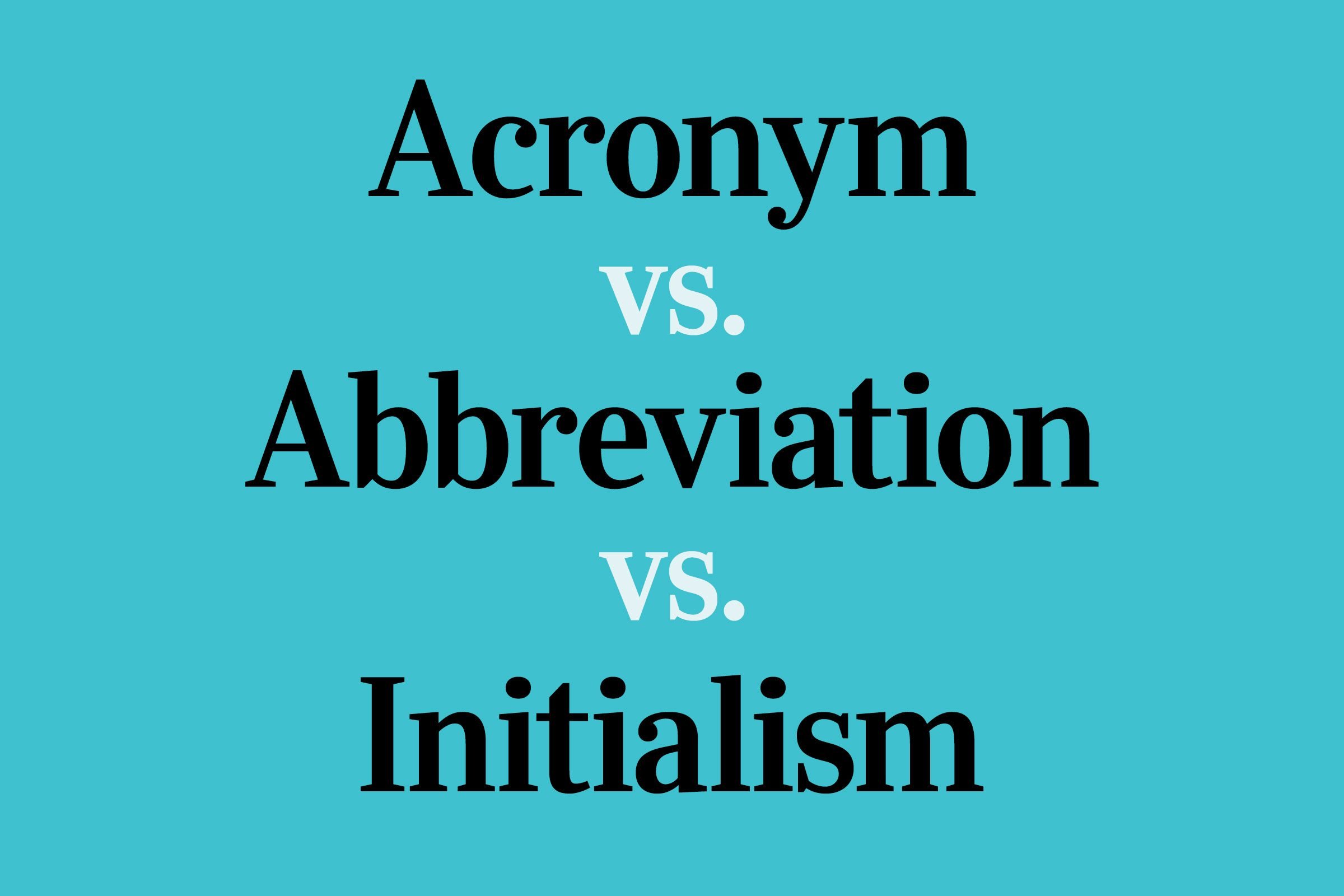What's the difference when discussing acronym vs. abbreviation vs. initialism? It has to do with how you're shortening a word or phrase.

Acronym vs. Abbreviation vs. Initialism: What’s the Difference?

ICYMI (in case you missed it), acronyms, abbreviations, and initialisms are ways to shorten phrases and ideas both in normal speech and through texting and email. But a common FAQ (frequently asked question) is explaining the nuanced difference between the three ways to save breath—which we do, below. You’ll be able to tell the difference between acronym examples, texting abbreviations, and common initialisms going forward.
What’s the difference between an acronym, abbreviation, and initialism?
Some people think these three are interchangeable (a common grammar myth), but technically, acronyms and initialisms are types of abbreviations formed in specific ways. Therefore, they don’t technically mean the same thing. Let’s dive into the differences and how to identify each.
Abbreviation
An abbreviation is a way to shorten a phrase. Many common abbreviations tend to shorten the word being referenced by literally shortening the word but not creating a new one. Here are some abbreviation examples:
- Ave., which is an abbreviation for “avenue”
- Dec., which is an abbreviation for “December”
- Etc., which is an abbreviation for “et cetera”
- Photo, which is an abbreviation for “photograph”
- Exam, which is an abbreviation for “examination”
Acronym
An acronym is a type of abbreviation that shortens a phrase by combining the first letter (or letters) of each word in the phrase to form a new pronounceable word. Here are some acronym examples:
- NASA, which stands for National Aeronautical and Space Administration. To form the acronym NASA, you take the first letter of each of the words in the phrase “National Aeronautical and Space Administration” and then pronounce the collection of letters as a new word—we pronounce the term as “nah-suh” and not the individual letters “N-A-S-A.”
- FOMO, which stands for “fear of missing out”
- LASER, which stands for “light amplification by stimulated emission of radiation”
- RADAR, which stands for Radio Detection And Ranging
“GIF” is another common acronym—but what does GIF stand for and how do you pronounce it?
Initialism
An initialism is another type of abbreviation similar to an acronym—but not exactly the same. Initialisms also use the first letter of each word in the phrase, but instead of combining the letters to form a new word, like with “NASA,” you pronounce each letter individually. Here are some examples:
- VIP, which stands for “very important person”
- DVD, which stands for “digital versatile disc”
- ATM, which stands for “automatic teller machine”
- AM and PM, which stand for “ante meridiem” and “post meridiem”
- RSVP, which stands for “répondez s’il vous plait“
So…are they abbreviations?
Yes! Technically, acronyms and initialisms are types of abbreviations. Not all abbreviations, though, are acronyms or initialisms—those terms refer to specific types of abbreviations formed from taking the first letters of words in a longer phrase or name. The real confusion comes when determining which of those types of abbreviations are acronyms and which are initialisms. Since initialisms are similar to acronyms, many people say that “acronym” can be a blanket term that also covers initialisms, as yourdictionary.com points out. A lot of people do use the word “acronym” to refer to an initialism that technically is not an acronym because it’s not pronounced as a word. Merriam-Webster is defines an initialism as “an abbreviation formed from initial letters,” but acknowledges that “acronym is commonly used to refer to both types of abbreviations.” However, other sources disagree.
OK, so here’s a quick recap:
- Abbreviations are meant to shorten words or phrases to speed up communication
- Acronyms and initialisms are types of abbreviations
- An acronym is formed when you combine the first letters of a phrase to create a new word (think LASER) Did you know canola in canola oil has been an acronym this whole time?
- An initialism is formed when you combined the first letters of a phrase but say the individual letters (think VIP)
Also, don’t get too bogged down on the nuanced terminology of initialisms, acronyms, and abbreviations. At the end of the day, if you know the main differences between the three you’ll be seen as a grammar genius. And IMO (in my opinion), that’s what really matters.
Next, learn what SOS means and where exactly it came from.
Sources:
- Merriam-webster.com. Initialism.
- Yourdictionary.com. What Is the Difference Between an Abbreviation and an Acronym?
- Yourdictionary.com. List of Common Acronyms.
- Enchantedlearning.com. Acronyms and Initialisms: Worksheet Printouts.






















